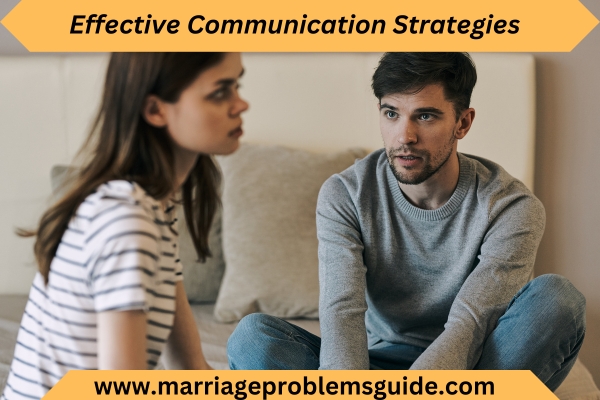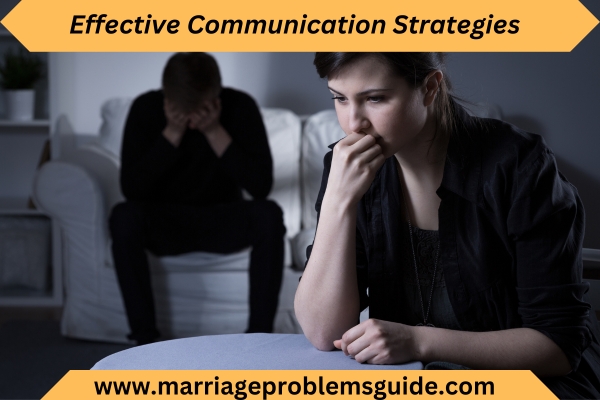Effective Communication Strategies for Resolving Marriage Conflicts
Marriage conflicts are inevitable. Even the healthiest marriages experience disagreements and arguments from time to time. The key is not to avoid conflicts in marriage but to resolve them in a healthy, positive way through effective communication.
This allows couples to reach an understanding, compromise, and move forward in their relationship. In this article, we will share Effective Communication Strategies for Resolving Marriage Conflicts.
What is effective communication?
Effective communication is the ability to express yourself clearly while also understanding your partner. It’s not just about talking, but also listening, observing body language, and validating emotions. Effective communicators manage conflict in a constructive way and are able to find solutions.
Some key elements of effective communication in marriage include:
- Active listening without judgment
- Assertive but respectful expression of your feelings and needs
- Empathy and perspective-taking
- Compromise and negotiation
- Focusing on the present issue, not past grievances
Why is effective communication important for resolving marriage conflicts?
Marriage conflicts are inevitable. But with effective communication, couples can navigate disagreements in a healthier way and even grow closer. Poor communication exacerbates problems because:
- Misunderstandings lead to hurt feelings
- Lack of validation causes defensiveness
- The inability to articulate needs leads to unresolved problems
- Arguments repeat in a cycle without resolutions
Effective communication allows spouses to share feelings, articulate needs, understand each other, and find mutually satisfactory compromises. It deepens intimacy and respect between partners, strengthening the marriage.
Resolving Marital Disputes Through Empathetic Dialogue
1. Listen Actively to Understand Your Spouse’s Perspective
Active listening is essential for resolving marital conflicts. When tensions are high, it’s easy to get defensive and only focus on your own feelings and opinions. But taking the time to truly listen to your spouse’s perspective without judgment demonstrates caring, respect, and a willingness to work together.
Give your full attention when your partner is speaking. Maintain eye contact, avoid interrupting, and reflect back on what you hear in your own words to show you understand. Ask clarifying questions if needed. Listening first helps diffuse strong emotions so you can have a thoughtful discussion.
2. Express Your Feelings and Needs Calmly
In marriage disputes, how you communicate your own perspective also matters. Yelling, sarcasm, and blame will only escalate the conflict. Instead, use “I feel…” statements to express your emotions and needs constructively.
For example, “I feel sad when my feelings seem unimportant in our discussions.” This makes the issues about your relationship, not attacking your spouse.
Focus the conversation on finding solutions instead of determining fault. A calm, respectful tone will help your partner be more receptive. Take a break if needed to cool down before continuing the discussion. Managing your own reactions prevents little conflicts from blowing up.
3. Find Compromises Through Negotiation
Marriage requires give and take. During marital conflicts, be willing to negotiate and compromise to reach an outcome you both feel okay with. Don’t make demands that force your spouse to give in. Identify shared goals, acknowledge each other’s points of view, and look for a mutually acceptable resolution.
For example, if arguing about how to spend a weekend, find aspects of each person’s desired activity to incorporate. Compromise demonstrates you care about each other’s needs and respect your partner, strengthening your bond.
4. Focus on Solving the Conflict, Not Winning
When spouses treat disagreements as competitions that one person must win, it inevitably breeds resentment. To resolve marriage conflicts, switch your mentality from battling your partner to cooperating with them against the issue. You want to solve the problem, not defeat each other.
Avoid power struggles. If you “win” by overriding your spouse’s wishes, your relationship loses. Instead, approach the situation with flexibility and creativity to find a solution that satisfies both spouses as much as possible. Meeting in the middle maintains your team spirit.
5. Pick Your Battles and Let Small Things Go
Not every issue in marriage warrants a major conflict. We all have small annoyances and differences. Before turning a minor irritation into a huge fight, consider if it’s really that important or something you can just let go.
Save your energy for addressing underlying causes of unhappiness like lack of intimacy or trust. Don’t sweat the small day-to-day stuff. Letting go of the need to be right about little things preserves the health of your marriage.

6. Avoid name-calling and insults
Criticizing your partner provokes defensiveness. Using insults and spiteful name-calling escalates anger, making it impossible to have a thoughtful discussion.
Avoid attacking your spouse’s personality or character during conflict. Focus only on the specific issue and your feelings around it.
7. Choose the right time and place to talk
Don’t start a heavy discussion when you or your partner is already stressed, tired, or distracted. Instead, wait for a relaxed moment when you’re calm and ready for a caring dialogue.
A private setting without interruptions or an audience also allows for more open, constructive communication.
8. Be specific
Vague complaints like “you never help me” worsen conflict because people feel unfairly accused. Use “I” statements to explain exactly what you feel without blaming, and specify the behaviors that are affecting you and why. This reduces defensiveness.
9. Focus on the present
Bringing up past issues and history makes your spouse feel like they can never redeem themselves. It also moves the conversation away from solutions. Focus just on the current conflict and how to solve it together now.
10. Be willing to forgive
Holding grudges over old arguments that you’ve already resolved keeps you stuck in negativity. Accept apologies and let go of resentment so you can move forward in a spirit of understanding and good faith.
11. Seek Counseling if Communication Breaks Down
If you just can’t seem to resolve recurring conflicts no matter what you try, seek the guidance of a trained marriage counselor or therapist. They can give you tools to communicate in a healthier way and get to the root of misunderstandings.
Having an impartial third party facilitate difficult conversations may reveal disconnects you didn’t see before. Marriage counseling is not a sign of failure but wise proactive maintenance of your relationship.
Tips for improving communication with your spouse
- Schedule weekly check-ins to air grievances before they become huge fights.
- Seek counseling to learn healthier communication strategies if your current ones lead to frequent blowups.
- Recognize your spouse’s positive communication efforts and attempts to meet your needs.
- Use a calm, kind tone even when disagreeing to encourage openness.
- Repeat your understanding of your partner’s perspective to ensure you have it right.
- Give your spouse time to process and think before responding if emotions are running high.
With mutual effort, empathy, and gratitude, you and your spouse can make your communication effective enough to navigate any conflict in a growth-oriented way.
With empathy, active listening, and cooperation, you can navigate any marital dispute. Maintaining open communication and respect are the keys to resolving conflicts in a way that brings you closer together as partners. Learn here more about marriage conflict resolution tips and guides.

